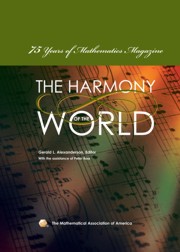Book contents
- Frontmatter
- Introduction
- Contents
- A Brief History of Mathematics Magazine
- Part I The First Fifteen Years
- Part II The 1940s
- Part III The 1950s
- Part IV The 1960s
- Part V The 1970s
- Trigonometric Identities
- A Property of 70
- Hamilton's Discovery of Quaternions
- Geometric Extremum Problems
- Pólya's Enumeration Theorem by Example
- Logic from A to G
- Tiling the Plane with Congruent Pentagons
- Unstable Polyhedral Structures
- Part VI The 1980s
- Briefly Noted
- The Problem Section
- Index
- About the Editors
Hamilton's Discovery of Quaternions
from Part V - The 1970s
- Frontmatter
- Introduction
- Contents
- A Brief History of Mathematics Magazine
- Part I The First Fifteen Years
- Part II The 1940s
- Part III The 1950s
- Part IV The 1960s
- Part V The 1970s
- Trigonometric Identities
- A Property of 70
- Hamilton's Discovery of Quaternions
- Geometric Extremum Problems
- Pólya's Enumeration Theorem by Example
- Logic from A to G
- Tiling the Plane with Congruent Pentagons
- Unstable Polyhedral Structures
- Part VI The 1980s
- Briefly Noted
- The Problem Section
- Index
- About the Editors
Summary
Editors' Note: In the mid-twentieth century there was a two-volume set of books that every graduate student in mathematics knew: Moderne Algebra, by B. L. Van der Waerden. This pioneering work, published by Springer in 1931 and appearing in English translation in 1949, brought to graduate education the work of Emil Artin and Emmy Noether that had revolutionized the approach to algebra. The English version was delayed in reaching American universities because of World War II, since the copyright was vested in the Alien Property Custodian in 1943 and the actual publication had to be authorized by the U.S. Attorney General!
Bartel Leendert van der Waerden studied at Amsterdam and Göttingen and in 1924, at the age of 22, he studied with Noether. This experience no doubt prompted his efforts to promulgate her ideas through writing the algebra text. After stays in Groningen, Leipzig, Johns Hopkins and Amsterdam, he took a position at the University of Zürich where he remained for the rest of his life.
His mathematical work ranged from algebraic geometry to various branches of algebra—Galois theory, ring theory, and Lie groups. He had been consistently interested in the history of mathematics throughout his career and in 1950 he published his Ontwakende wetenschap, published in 1954 in English as Science Awakening. This, along with his algebra text, is probably his best known work.
- Type
- Chapter
- Information
- Harmony of the World75 Years of Mathematics Magazine, pp. 143 - 150Publisher: Mathematical Association of AmericaPrint publication year: 2007



